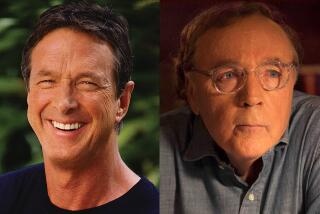‘Rising’ Differences : Movies: Michael Crichton’s best-seller is opening this summer. But not without script battles and character changes.
- Share via
If readers were shocked by Michael Crichton’s politically charged best-selling novel “Rising Sun,” they’re in for an even bigger shock this summer: In the movie version, set for release in mid-July, there’s a new villain.
And the man responsible is director Philip Kaufman, who, in rewriting Crichton’s own screenplay, changed the identity and ethnicity of the murderer.
In Crichton’s novel--or polemic parading as a thriller, as many book critics said--a beautiful female escort is strangled in the conference room of Nakamoto Towers in Los Angeles. The ensuing investigation by L.A. police detectives Connor (Sean Connery) and Smith (Wesley Snipes) reveals not only the identity of the killer but a conspiracy perpetrated by the Japanese to systematically take over American business by whatever means possible.
Kaufman cast Wesley Snipes as one of the leading characters, a police investigator and liaison officer to the Japanese community. The character in the book is white, and the LAPD has no black officers in its Asian Crime Investigations Unit.
“Phil’s an old lefty and at the end of the day, it’s like the (La Brea) Tar Pits; his political bent always seeps through,” said a source close to the $30-million to $35-million 20th Century Fox Film production. Another source termed the changes “political correctness masking as artistic license.”
Charges that Crichton’s depiction of the Japanese was racist were leveled at him after the book’s publication. Crichton countered that “Rising Sun” should have been taken more as a wake-up call to the U.S. government to get its trade policies with Japan in order or face a certain future as a second-rate power.
But much less of Crichton’s politics survive in the film version. Details have been revealed because Kaufman, not in many filmmakers’ assessment the easiest man to work with, has been waging a fight to get sole screenwriting credit.
Sources said Crichton, whose other bestseller “Jurassic Park” will also be a summer movie this year, and co-screenwriter Backes turned in one faithful adaptation of the book and an additional rewrite to Fox and Kaufman before things went awry.
Kaufman, a screenwriter himself, asked for five separate rewrites of the script’s first 40 pages before it became clear that he wanted to rewrite the screenplay entirely by himself, the sources said. By November, 1991, Crichton, who had been paid $1 million for the rights to his bestseller, and Backes were off the picture.
Following a “polish” by David Mamet and the completion of shooting last fall, Kaufman sought to claim sole screen credit for himself with the Writers Guild of America. As of Wednesday the guild decided that his contributions were not sufficient enough to remove the original screenwriters from the film’s final credits. They will now read: Screenplay by Philip Kaufman and Michael Crichton & Michael Backes based on the novel by Michael Crichton.
Crichton, who would not comment on the situation, was said by an associate to be smarting over the experience--more than he ever did as director of seven Hollywood features, including “Coma” and “Westworld,” or as screenwriter of his own books that are widely regarded as “camera-ready” for adaptation by Hollywood.
For instance, one of the book’s main characters, John Connor, a retired police expert on Japan whose advice Snipes successfully solicits, was named precisely because Crichton envisioned Connery in the role.
Other filmmakers have had their own run-ins with Kaufman. In his funny-but-biting Hollywood biography “Adventures in the Screen Trade,” screenwriter William Goldman characterized his experience adapting Tom Wolfe’s “The Right Stuff” for Kaufman as a “nightmare.” Goldman also was off that picture before the cameras rolled.
Kaufman has developed a reputation as an exacting adapter (at least visually) of literary works--”The Right Stuff,” “The Unbearable Lightness of Being” and “Henry and June”--who makes movies averaging 2 1/2 hours in length that critics often rave about but the public is not in any rush to sit through. None of the above movies was a hit theatrically.
Problems with length reportedly have now led to a contretemps with “Rising Sun” co-star and executive producer Connery, sources say. Kaufman is contractually bound by Fox to deliver a movie not longer than two hours, which sources said is proving to be a challenge.
The Oscar-winning actor is said to be unhappy that Kaufman can’t seem to get his “director’s cut” shorter than its current two-hour-eight-minutes running time. The movie was tentatively scheduled for an early-summer opening and sources say it was pushed back to mid-summer because of delays in his editing.
Kaufman was said by a spokeswoman at his Walrus and Associates production offices in San Francisco to be too busy finishing the movie to answer a reporter’s questions.
Connery was traveling and unavailable for comment.
At Fox, however, “We are extremely high on the movie. We think it plays really well and it has all the elements to be a big hit, “ said Andrea Jaffe, president of domestic marketing for the studio.
But while skepticism runs rampant that the movie may not be able to deliver the political punch the book did, no one can say for sure because a only handful of people--the principal filmmakers and top Fox studio brass--have seen the film.
Besides Crichton and Backes, who have not seen it, two former Fox executives who oversaw its development and production, Joe Roth and Roger Birnbaum, are curious about its outcome. Now working together under their own independent production banner, Caravan Pictures, based at the Walt Disney Studios, the duo asked Fox if they could see a rough cut.
They are negotiating to make other movies with Connery and Crichton.
More to Read
Only good movies
Get the Indie Focus newsletter, Mark Olsen's weekly guide to the world of cinema.
You may occasionally receive promotional content from the Los Angeles Times.









